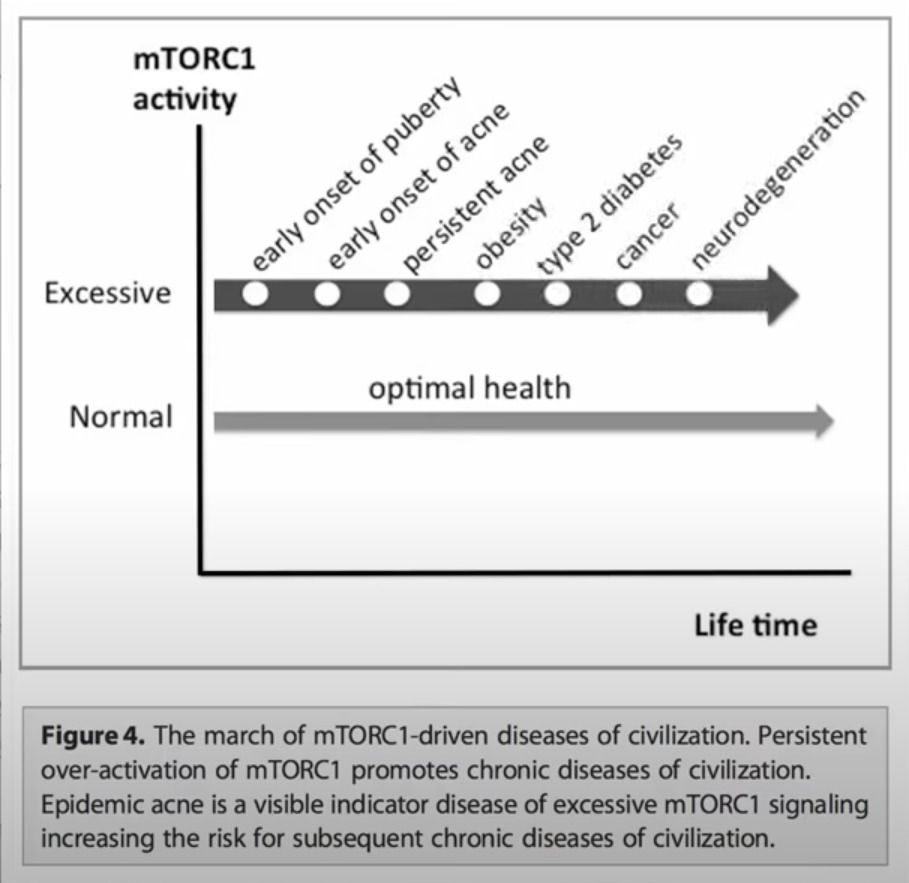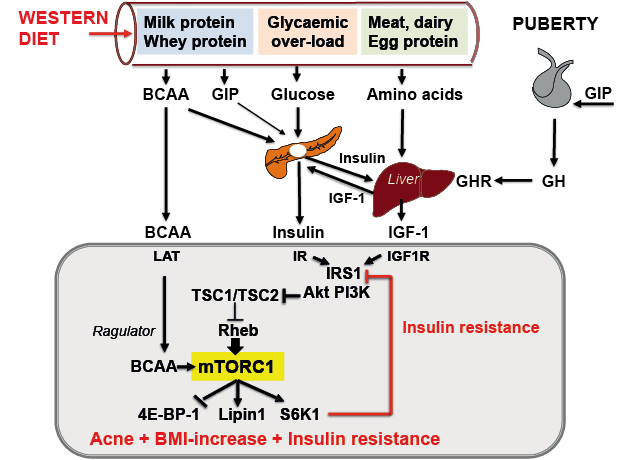
Dr Greger explains that the last 15-20 years have witnessed a sudden burst of research papers in "over-stimulated mTORC1 signaling": 5,000+ papers have been written to understand this mechanism in detail.
Researchers are now suggesting that acne (which occurs in 85% of teens in USA) should be considered a leading marker for more serious diseases to come in future. So dermatologists should learn a bit about nutrition and chronic lifestyle diseases, especially cancer and suggest to teens that they should look into cancer-prevention diets! The situation is similar to urologists being asked to learn about heart disease risk assessment because ED (erectile dysfunction) is considered a marker for impending heart disease — see Atherosclerosis & Erectile Dysfunction.
How to avoid mTOR overactivation? Three food sources are being implicated for "over-stimulated mTORC1 signaling": (a) processed foods with high glycemic index, (b) milk and dairy products, (c) meats.

A key diagram from a paper explains that Milk, Eggs, Meat, and "glycemic overload" triggers mTOR1 over stimulation. What to do? Clearly, we should remove milk, eggs and meat, and avoid processed foods, sugars, flours and refined grains (to avoid glycemic overload)… right? In other words, we may choose to adopt a Wholel Food Plant-Based diet!
… but what do the authors of this paper suggest? A Paleo diet (!) In a Paleo diet, we remove processed foods, sugar, flours and refined grains (but we also remove whole grains — Paleo diets are grain-free); we also remove dairy (Paleo diets are dairy-free). However, we amplify meat & eggs! But meat & eggs lead to mTORC1 overactivation, as the diagram above shows! What's going on? Why don't the authors of the paper suggest a vegan diet or a Whole Food Plant-Based diet? A vegan diet (with zero meat, fish, eggs n dairy) was probably a blind spot for these researchers — they can't possibly imagine a diet with zero animal products. This phenomenon—that researchers are unable to conceive a vegan diet or a Whole Food Plant-Based diet even though their own data points in that direction— shows up in other research papers and presentations too.
Articles by Dr Greger:
- (2016) How to Suppress the Aging Enzyme TOR
- (2016) The Dietary Link Between Acne & Cancer
- (2015) Living Longer by Reducing Leucine Intake
- (2015) Exploiting Autophagy to Live Longer
Videos by Dr Greger: A 4-part video series from 2014 explains TOR signaling and its relationship to myriad chronic conditions:
(4 mins) Transcript. Dr Greger's summary: "A bacteria discovered on Easter Island may hold the key to the proverbial fountain of youth by producing rapamycin, which inhibits the engine-of-aging enzyme TOR."
(4 mins) Transcript. Dr Greger's summary: "The lifespan extension associated with dietary restriction may be due less to a reduction in calories, and more to a reduction in animal protein (particularly the amino acid leucine, which may accelerate aging via the enzyme TOR)."
(4 mins) Transcript. Dr Greger's summary: "Suppressing the engine-of-aging enzyme TOR (Target of Rapamycin) by reducing intake of leucine-rich animal products, such as milk, may reduce cancer risk."
(5 mins) Transcript. Dr Greger's summary: "Over-activated TOR signaling may help explain the link between acne and subsequent risk for prostate and breast cancer."
This is a fascinating video! Is there an underlying mechanism that's common to acne, obesity, type 2 diabetes, arterial hypertension, Alzheimer's and various cancers (especially prostate cancer)? Yes: "Over-stimulated mTORC1 signaling". The last 15-20 years have witnessed a sudden burst of research papers in this area: 5,000+ papers have been written to understand this mechanism in detail.
Three food sources are being implicated for "over-stimulated mTORC1 signaling": (a) processed foods with high glycemic index, (b) milk and dairy products, (c) meats. Since the underlying mechanism is common, researchers are now suggesting that acne (which occurs in 85% of teens in USA) should be considered a leading marker for more serious diseases to come in future. So dermatologists should learn a bit about nutrition and chronic lifestyle diseases, especially cancer and suggest to teens that they should look into cancer-prevention diets! The situation is similar to urologists being asked to learn about heart disease risk assessment because ED (erectile dysfunction) is a marker for impending heart disease.
(8 mins) Transcript. Excerpt:
(6 mins) Transcript. This video focuses on sulforaphane from cruciferous veggies and explains how it may counter TOR overactivation to our advantage.
David Sabatini, PhD, is the co-discoverer of the mTOR pathway! A fast-paced, information rich presentation:

 Instagram
Instagram YouTube
YouTube